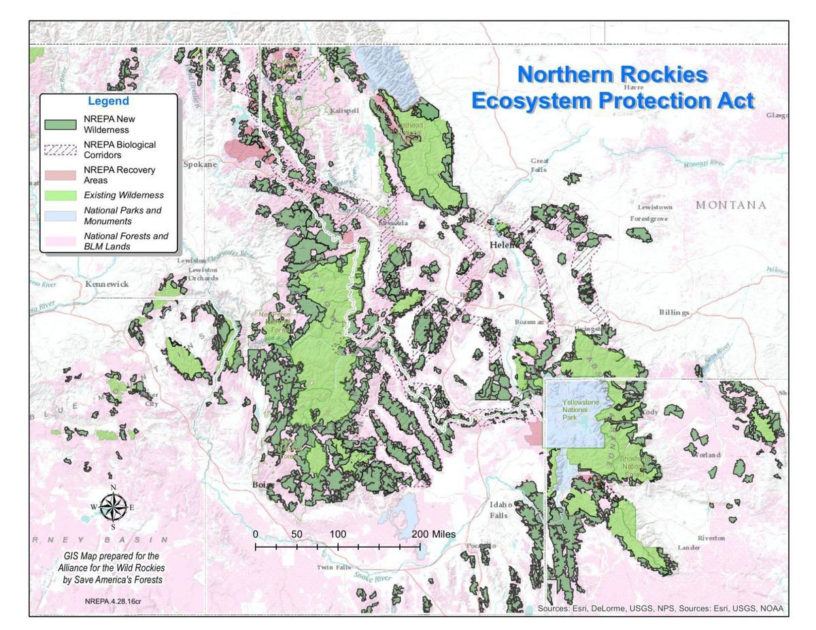
Storm over the Gallatin Range. Photo: Jeffrey St. Clair.
We are rapidly dismantling the biological and aesthetic integrity of the entire planet, and can’t pretend any longer that small and compromised efforts can fix our threatened condition. Yet pretending is exactly what the widespread and celebrated “collaboration and compromise” model of resolving conservation disputes does.
That model’s practitioners dismiss those who speak up for necessary, bold preservation as impractically seeking the impossible, claiming that their voices can be excluded from bartering groups because they are “at the margins.”
On the other hand, famed eco-sociologist E. O. Wilson, now 90 years old – during those moments when he is not despairing of our future – finds hope only in passionate, place-based groups who seek precisely this “impossible,” groups like Montana’s Alliance for the Wild Rockies and the Gallatin Yellowstone Wilderness Alliance.
Crucially and in this vein, Aldo Leopold wrote that “All ethics so far evolved upon a single premise: that the individual is a member of a community of interdependent parts.” He implored us to “examine each question in terms of what is ethically and esthetically right as well as what is economically expedient. A thing is right,” he continues, “when it tends to preserve the integrity, stability, and beauty of the biotic community. It is wrong when it tends otherwise.”
The “collaboration and compromise” approach has come unmoored from necessary ethical and aesthetic foundations, in favor of expediency. Its adherents agree to the continuing maw of contemporary society and its seemingly inexorable cannibalization and excretion of the biosphere. Against the odds of well-funded public relations campaigns by such Centrist, expedient types, liberatory groups demanding the more-difficult-to-acquire continue to do the right thing, per Leopold’s affirmation.
The Alliance for the Wild Rockies – with its proposed and crucially, integrally vast Northern Rockies Ecosystem Protection Act, and the Gallatin Yellowstone Wilderness Alliance – which promotes Wilderness designation for all worthy lands in the northern Greater Yellowstone Ecosystem – both occupy the latter position. They refuse to negatively hallucinate the dire state of the planet or the terrible and expediency-compromised political force of the so-called collaborators.

Those collaborators, aligned with governmental business-as-usual entities – from County Commissioners to state and federal legislators and Chambers of Commerce – continue to cede more and more undesignated Wilderness-quality lands, à la the Wilderness Act of 1964, in return for the putative political expediency of being allowed some lands into Wilderness. They gain publicity as having achieved a conservation “victory.” But they leave out of their discourse, or overtly mis-represent, the hard reality of scientifically demonstrable defeats for the biota affected by their horse-trading, including the cumulatively worsening whittling and sometimes mowing away of our remaining wild lands.
Eco-systemically conscious groups like AWR and GYWA are all too aware of, and guide their conservation aims upon, the holistic consideration of our awfully degraded yet profoundly interdependent Earth. Large and planetarily vital ecosystems like those of the Northern Rockies and the Greater Yellowstone are still quite intact and tremendously rich; such places as these have become rare across the planet. Keeping them intact is not only part and parcel of maintaining their aesthetic wonder, but is necessary to global, biotic health. These places maintain their flora and fauna on a scale and type found before industrial and post-industrial colonization. Yet their continued maintenance – think iconically of the wolverine, the grizzly bear, the buffalo, the gray wolf – is hardly guaranteed.
The infinite-growth juggernaut and defiler that is our existing society and its ways of doing business, finance, and politics, has got to be taken account of by all conservation groups with an ethical foundation. It is, in fact, impractical to do anything else. We have got to be able to say “Enough is enough” when industry comes knocking and science says no. We have got to be able to ask any and all ethical and political questions, and, as cultural critic Henry Giroux has said, insist upon them in ways “loud, educative, noisy, disruptive, systemic, and ongoing.” It is wrong, as Leopold enjoined us to grasp, to act environmentally in any other way.
A globally just society and a vibrant earth for that society to live on are only impossible if humanity cannot find a sufficiently collective voice to demand them. Conversely, they are only possible if their inextricable links are met head-on, accounting for mega-ethical and mega-political questions about the biotic future of the earth and humanity. Groups like the Alliance for the Wild Rockies and the Gallatin Yellowstone Wilderness Alliance truly are “at the margins,” but not in the maligned sense that’s been hurled at them, but rather in the sense of occupying and insisting upon a visionary position.
Joseph Scalia III, Psya.D. is a social critic and a practicing psychoanalyst in Livingston, Montana. Dr. Scalia is the current President of the Gallatin Yellowstone Wilderness Alliance and a former president, and critic, of Montana Wilderness Association.